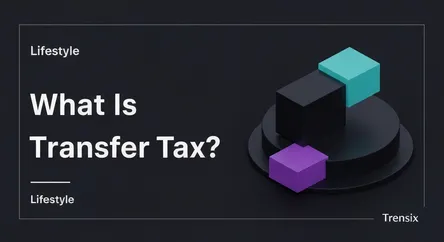Lifestyle
What Is Transfer Tax?

Learn about transfer tax, a fee on property title transfers. Understand how it's calculated and who pays for it during real estate transactions.
What is it?
A transfer tax is a levy imposed by a state, county, or municipal government on the transfer of property ownership from one person or entity to another. Often called a deed tax or real estate conveyance tax, it is typically calculated as a percentage of the property's sale price. This one-time fee is paid at the closing of a real estate transaction when the property's title is officially transferred to the new owner. The specific rates and rules can vary significantly depending on the location of the property.
Why is it trending?
Transfer taxes are a hot topic due to the dynamic real estate market and evolving municipal budget needs. As property values have risen in many areas, the revenue generated from these taxes has become a more significant source of funding for local services like schools, infrastructure, and public safety. Consequently, some jurisdictions are re-evaluating or increasing their transfer tax rates to capitalize on the market, sparking public debate among homeowners, real estate professionals, and policymakers about housing affordability and government spending.
How does it affect people?
For individuals buying or selling a home, the transfer tax represents a major closing cost that must be factored into their budget. Depending on local customs and negotiations, the responsibility for paying the tax can fall on the buyer, the seller, or be split between them. For a seller, it directly reduces their net profit from the sale. For a buyer, it's an additional upfront cost on top of the down payment and other fees, potentially impacting their ability to afford a property. Understanding this tax is crucial for accurately calculating the total cost of a real estate transaction.